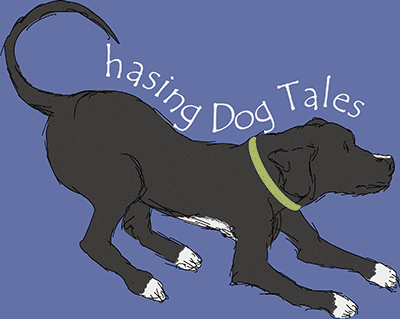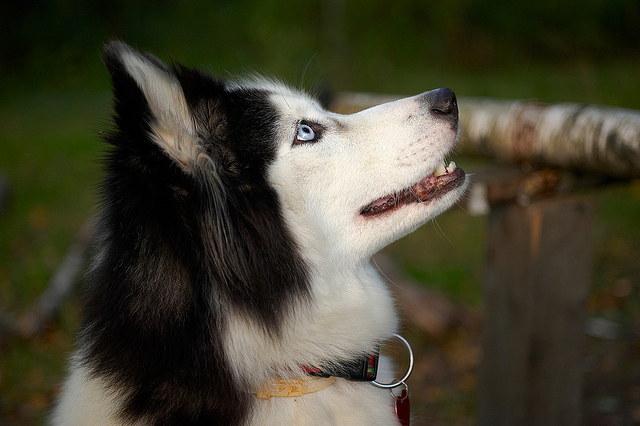It’s not that your dog is intentionally ignoring you, it’s just that you’re competing with all the interesting sights, sounds and smells in her world and she hasn’t yet learned how interesting you can be. The solution is to show her the benefits she’ll receive when she pays attention to you.
Begin with this easy training exercise.
Getting You Dog’s Attention
Start in a small space such as a hallway with a treat your dog really likes. Show her that you have the treat in your hand, then drop it on the floor behind you. She’ll immediately try to get to the treat and your job is to quietly block her from it. Block her from going around you or through your legs, just make sure she doesn’t wiggle by you and get the treat. After several unsuccessful attempts, she’ll get frustrated and look at you. When she makes eye contact, immediately give her the treat and praise her.Pretty simple, huh? This concept teaches your dog that good things happen when she looks at you or pays attention to you. Once she understands this basic exercise, expand on the concept by trying some of the exercises below.
These are just a few ways you can use this technique with your dog as you go through your daily routine. Anytime your dog wants something (food, a treat, a toy, to go outside, to play), it’s an opportunity to train your dog to pay attention to you. Quietly blocking and patiently waiting for eye contact before rewarding your dog with something she wants is a very effective way to strengthen the bond between you and your dog. It also makes training much easier, teaches your dog to look to you for direction and teaches her to ask for permission for things.
What are some other ways you have used this technique or other exercises to get your dog’s attention?


I’m really happy with my dogs attention – we certainly had to work on it though. I love your advice, we followed most of those steps and made sure to add a ton of praise to keep us super interesting. It makes all training so much easier when you’re able to hold your dogs attention. Great tips.
Thanks Jen, It really does make everything easier when you develop that kind of attention and relationship doesn’t it?
My dog is really good except for when he is “tracking” something. He must have some kind of hound in him or something, because he gets really interested in scents sometimes. I do need to make a point to carry some yummy treats more often to reward and reinforce him for paying attention.
Yeah, it’s pretty hard to compete with a super interesting scent sometimes 🙂
Getting a pyr’s attention is always quite the task. Treats seem to do the trick 🙂
They are beautiful dogs! With Haley being part lab and part boxer, she was pretty easy to train. Luckily, treats seem to work with almost all dogs.
Chewy is usually great about sitting nicely before getting what he wants. But once he gets his treat or out the door, it’s a whole other story! Definitely something we are still working on!
Haha! Yes, sometimes they definitely have selective hearing. 🙂
Great tips! I was so hoping you would include tips about getting your dog’s attention when they are throwing ducks at a hunt test. 🙂 That is what we are currently working on.
I have to admit that I had to read up on the hunt tests, but it sounds fascinating to watch all the dogs at various levels of the competition. Good luck with the training and tests!
Hi, I came across your webpage last night and have reading a lot. Thank you. Very helpful tips. I have a Miniature schnauzer and I’m so worried since she started sort of attacking me when I try to be firm and correct her by giving her a tiny tap on her thigh. It’s like she’s going through puberty (she’s 7 months old), she won’t come when I call her, and the worst is that as soon as I open the door to our apartment she wiggles out of my grip and goes down the stairs and won’t come up until I go and carry her up, I know she probably wants to go out for a walk but this happens when I have to go to work or leave the house. I think I have a teenager that used to love me and now hates me… Help!!!! Thanks again!
Hi Natalia,
I think you totally nailed it when you said she’s acting like a teenager. When dogs are between 6-12 months old, they go through a maturity phase where they challenge and test you and it can be frustrating because suddenly your sweet puppy seems to have forgotten their manners and training and they may try to assert themselves in new ways.
The good news is, she doesn’t hate you. It’s a normal phase and luckily it doesn’t last that long but you do need to reinforce training and maybe even do some more socializing during this period.
I would avoid any physical corrections that might provoke her to respond physically and instead work on getting her attention and having her focus on you before she gets anything she wants. For example, she must sit and look at you before getting a toy she wants, or before getting her dinner. You can pretty much apply that process to almost anything she wants during the day (treats, toys, food, going outside for a walk…)
By doing that, you’ll strengthen the bond between the two of you and she’ll learn to be more patient and look to you for direction instead of just rushing the door or getting whatever she wants immediately.
Using the same principle as in this article, here’s something to try with the door issue.
Work with her when you have some free time by opening the door just an inch or so. At first, she’ll probably try to rush the door or maybe even get her nose through, but keep it at just an inch open. After she realizes she can’t get out, she’ll probably look at you as she’s trying to figure out what’s going on. Ask her to sit and after she sits and looks at you, praise her and then go out the door together with her on a leash. You’ll gradually work with opening the door a little wider, but the goal is to have her sit and wait until you give her a signal that it’s okay to go through the door. I use the “Wait” command which means don’t move until I say “Okay”. Practice when you have free time and she’ll probably catch on quickly, then soon your “leaving for work” routine will be stress-free.
The extra work you put in now while she’s young will really pay off in having an easy and stress-free relationship with her. I’m so glad you stopped by today and good luck with the training.
Will this work on an older dog? Ria is about six turning seven and I’m thinking about training her a bit more on attention. I have tried the treats and she’s been looking but not sitting. I don’t know if new training would work if she’s getting to be a little older.